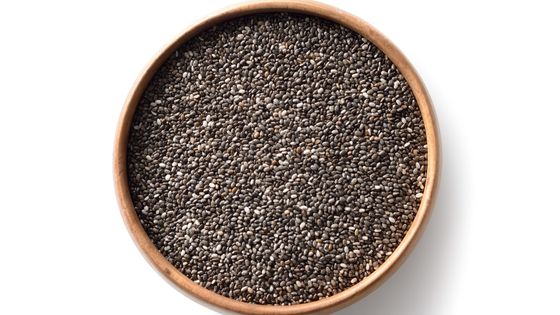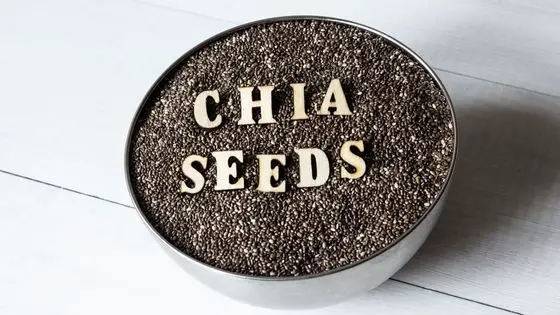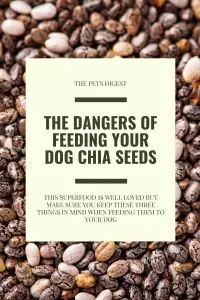Chia seeds are an increasingly popular treat for dogs but there are some things you should know before feeding them to your pup. Get the facts here and make an informed decision.
Can dogs eat chia seeds? Yes, dogs can eat chia seeds. To ensure your dog is safe always soak the seeds before feeding and make sure to give an appropriate dose for your dog’s size. Keep reading to learn more about feeding your dog chia seeds safely.
Are chia seeds good for dogs? Yes, chia seeds are good for dogs and are considered nontoxic by the ASPCA as they are on their nontoxic list.
While chia seeds are not toxic for dogs and can be added to their food safely there are some hazards and dangers you should be aware of to feed your dog chia seeds properly.
What are chia seeds?
Don’t let their size fool you, these tiny seeds were first harvested by the Mayans and have tremendous health benefits, and the Mayans believed that the seeds contained supernatural powers, and they may have been on to something!
Feeding these nutritional powerhouses to your dog can provide numerous health benefits of chia seeds, such as blood sugar regulation, improved energy levels, bone and joint health, healthy coat condition, and more.
They are one of the world’s most popular super seeds because of their nutrient-dense properties and are nonallergenic food sources.
Chia seeds are the seeds of the Salvia Hispanica plant, which is a member of the mint family. The plant grows in South America, Central America, and Mexico.
These tiny seeds have always been known for their positive impact on health. In pre-Columbian times they were known to give a boost of energy and in they were cultivated by the Mayans and Aztecs as a staple in their diet for increased endurance when running.
There are three varieties of chia seeds, white, red, and black and due to their wonderful properties, chia seeds are just as beneficial for dogs as they are for humans.
Keep reading to find out about the hazards and health benefits of chia seeds for dogs.
6 hazards of adding chia seeds to your dog’s food

Chia seeds are gaining popularity as a safe and nutritious treat for dogs but before you give your fur baby a handful of chia seeds you should know the dangers that can come along with feeding this superfood to your super friend.
1. Digestive issues
Chia seeds are packed with fiber and while this is often extremely beneficial for pets with digestive issues, if fed too much they can cause GI upset.
Chia seeds are a great source of fiber, providing 11 grams of fiber in each 1-ounce (28-gram) serving. While fiber can be of great benefit for your dog, especially if they have GI issues, too much of a good thing is as the saying goes a bad thing, a really bad thing.
2. Blockages
Chia seeds can hold up to 12 times their weight in water, which means they are wonderful at preventing dehydration but if taken dry can possibly cause major issues in your dog’s esophagus or stomach.
To read more about how to properly feed your dog chia seeds, read our article here.
3. Allergies
Though uncommon, some dogs may be allergic to chia seeds.
If you are giving your pup chia seeds for the first time make sure to keep an eye out for any possible allergic reactions and give a smaller amount to start out with.
As with any food allergy things to watch for are hives or a rash, swelling, itchy skin, diarrhea, and/or vomiting.
4. Omega 3 overload
Chia seeds are loaded with omega 3’s but there is a delicate balancing act between Omega 3 and Omega 6 fatty acids.
While this would be rare, make sure your pup is getting enough of both and not eating too many chia seeds.
5. Medication Interactions
As you’ll read in this article, chia seeds can minimally reduce blood sugar and high blood pressure if your pup is already taking medications for these issues speak with your vet prior to feeding your dog chia seeds as eating too many may cause hypoglycemia, or hypotension.
6. Feeding too young
Pet parents should refrain from giving young puppies chia seeds as their stomachs are still very sensitive

8+ benefits of feeding your dog chia seeds

The popular seeds have been shown to have therapeutic effects in the control of diabetes by promoting normal insulin function, weight gain, and hypertension, and are having beneficial effects on a dog’s immune system
Due to their high antioxidant effects, they are also believed to have liver and heart-protective effects, are anti-carcinogenic, and help with canine cognitive dysfunction in senior dogs.
Here are some reasons why you should speak with your veterinarian about incorporating chia seeds into your dog’s meals.
1. Chia seeds are packed with vitamins and minerals
Chia seeds are packed with vitamins and minerals. Dogs need to obtain most vitamins from their food. To read more about feeding your dog’s vitamins you can read our article here.
- Manganese
- Phosphorous
- Copper
- Selenium
- Iron
- Magnesium
- Calcium
- Zinc
- Vitamin B’s
2. They are anti-inflammatory
Chia seeds are well-known for their anti-inflammatory properties since they are a great source of antioxidants. The antioxidants found in chia seeds can help to fight free radicals in your dog’s body which can cause oxidative stress and cell damage.
- chlorogenic acid
- caffeic acid – is an antioxidant that helps fight inflammation in the body
- myricetin
- quercetin -an antioxidant that has been shown to reduce the risk of developing heart disease.
- kaempferol
3. They provide Alpha-Linolenic Acid & omega-3 fatty acids
The seeds have one of the highest amounts of alpha-linolenic acid out of all the other super seeds, even more than flax seeds. According to a popular published study, the higher proportion of α-linolenic acid makes chia a great source of omega-3 fatty acids
In fact, they have more omega-3 fatty acids than salmon
4. They are high in Fiber
Chia seeds are packed with soluble fiber which is beneficial for the digestive system and controlling diabetes mellitus and lower high blood pressure. Just a tablespoon of chia seeds has 10 grams of fiber.
The fiber in chia seeds absorbs water and makes your dog feel fuller faster, so adding the seeds to your overweight dog’s meals may prove to be beneficial.
5. They are antioxidants
These little seeds are full of anti-inflammatory and antioxidant activity. They help dogs bodies eliminate free radicals while giving them a nutritional boost.
6. Chia seeds can help with brain Improvement
They have been shown to help with brain function and are often given to dogs that suffer from canine cognitive dysfunction.
7. They help to regulate blood sugar levels
Chia seeds are a rich source of fiber and diets that are high in fiber help show insulin resistance and improved blood sugar levels in diabetic dogs. Feeding your dog chia seeds may help them regulate their blood sugar levels
8. The seeds help with healthy bone maintenance
Chia seeds have more calcium than milk and more iron than raw spinach.
Other benefits for dogs that eat chia seeds
- Healthy coat
- Preserve muscle tissue
- Immune system boost
- Help maintain a healthy weight
- Improves digestion (due to dietary fiber)
- They can help with lowering blood pressure
How do I know if my dog is having a bad reaction to chia seeds?
Keep a close eye out for any of the following signs:
- Gagging
- Vomiting
- Diarrhea
- Stomach upset and bloat
- Painful abdomen
How do I add chia seeds to my dog’s diet safely?
- Choose organic. When feeding your dog chia seeds opt for organic, this way you don’t have to worry about harmful pesticides or chemicals which can make their way into the seeds.
- Speak to your vet. You should always speak to your vet before adding anything to your dog’s diet
- Always soak them. Because chia seeds can take up a tremendous amount of water when soaked you should always presoak them before feeding them to your dog. Almost like soaking a dry sponge in a bowl of water. This will prevent them from swelling in your dog’s stomach. Soak them for at least 30 minutes but preferably overnight.
- Feed a proper serving size. The serving size should be based on your dog’s weight. To determine the appropriate serving size for your dog read our article here.
- Give chia with meals. Since chia seeds really don’t have a taste sprinkling some soaked chia seeds over your dog’s food or adding them to their water is a great way to introduce them.
- Watch your dog. Watch your dog for any of the previously mentioned reactions especially if it is your first time feeding them chia seeds.
How much chia should I give my dog?
Most pet owners give a quarter of a teaspoon for every 10 pounds of body weight.
Can I grow chia sprouts for my dog?
Have you ever heard of a chia pet? Well these are just sprouted chia seeds and yes dogs can eat chia seed sprouts, in fact, they are healthy and nutritious for them when given in the appropriate amount. Keep in mind that chia sprouts do have more of a taste than the seeds so your dog will probably pass.

Overall, chia seeds and dogs go together like peanut butter and jelly, if you feed them properly. Chia seeds are relatively safe to feed your dog in moderation and with supervision.
They have been shown to provide tremendous benefits not only because they provide essential nutrients but also promote weight loss, and healthy digestion and they can aid brain function. Always use organic seeds and speak to your vet before you add chia seeds to their food. to ensure feeding the appropriate amount for your dog’s body weight.
FAQs
Can dogs eat chia seed pudding?

Yes, they can but you should make sure to use homemade nut milk if doing so. However, they really gain no more nutritional value from it and should not be given a lot or too much as nut milk can irritate your dog’s stomach. For these reasons, it is best to forgo chia seed pudding.
How much chia seed should I feed my dog?
Most dog owners stick with the rule of thumb of giving a quarter of a teaspoon for every 10 pounds of body weight. You should always consult your veterinarian before making changes to your dog’s diet.
How do I prepare chia seeds for my dog?
The best way is to ensure they are fully soaked, provide a lot of water for your dog, and mixed with their food or water. We have an entire blog article about how to properly prepare chia seeds for your dog, the link is below.
How do I know my dog is having a bad reaction to chia seeds?
Look for gagging, vomiting, diarrhea, stomach upset, bloat, and a painful abdomen
Can some dog benefit from chia seeds more than others?
While every dog can certainly benefit from eating chia seeds there are some that could certainly use the added boost more than others, read more about it here.
Will chia seeds help my dog poop?
Due to their high fiber content, yes chia seeds can help some dogs use the bathroom more regularly.
Are chia seeds and flax seeds the same?
No, chia seeds are not the same as flax seeds. Flax seeds are also very beneficial and highly nutritious for dogs, to learn more about feeding your dog flax seeds read our article here.


Have a question? Leave it below or email: hello@thepetsdigest.com
Author: Dr. Jackson has practiced veterinary medicine for over 15 years and has three fur babies two of which have digestive issues.
References


























































































































my 15lb dog has pancreitits, what can i feed him? He is on antibiotics.
Did i leave my comment on the wrong place? If so here it is again. My 15 lb dog has pancreitits, I make all his food. What should i be feeding him. I have eliminated all fat from his diet.
Hi Carol, my dog is 7 pounds with pancreatitis, it’s always difficult to know how to maneuver around not feeding a prescription diet. I do incorporate an over the counter food in my dog’s meals but I also make food for him including bland chicken or beef (especially liver), for treats he loves carrots, apples, and broccoli. I wrote an article on what I how I feed him here. Thanks for stopping by!
My dog got the entire bag of chia seeds I don’t know if he ate them or they fell out all over the yard! Help
Hi lala, how big was the bag of Chia seeds and how big is your dog? While chia seeds arent toxic. If s/he ate a lot it could cause a blocage.
If this just happened today I would recommend calling your vet or the pet poison hotline and they can give you more information depending on your dog’s weight. Here’s the number, 1-800-213-6680. Let us know how everything works out